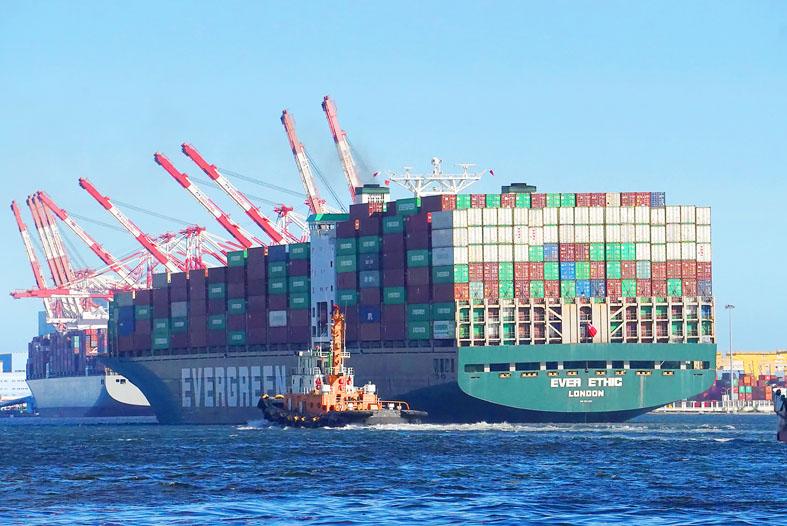Evergreen Marine Corp (長榮海運), the largest container shipping company in Taiwan, reportedly distributed year-end bonuses of as much as 40 months wages to some of its employees yesterday.
Some Evergreen employees have received about NT$2 million (US$72,228) in individual bonuses, local media reports said.
A couple who are entry-level supervisors at Evergreen told the Chinese-language China Times that they received a combined NT$5 million year-end bonus.

Photo: CNA
The two told the newspaper that they earn a base salary of NT$60,000 and that they have been working at the company for more than 10 years.
The shipping giant did not confirm the amount of individual bonuses, but said that each employee was compensated based on performance.
Despite the high-profile grounding of one of its ships in the Suez Canal in March, Evergreen reported net profit of NT$158.27 billion for the first three quarters of this year, an annual increase of 1,347.32 percent, with earnings per share of NT$30.27.
Evergreen’s next-largest peer, Yang Ming Marine Transport Corp (陽明海運), rewarded its employees with up to eight months of salary as year-end bonuses, several media outlets reported yesterday, without disclosing how the information was obtained.
The shipper reported net profit of NT$109.88 billion for the first three quarters, up 5,839 percent from a year earlier. The company’s earnings per share reached NT$32.73, the highest among local peers.
The shipping companies said that the significant revenue growth is a result of rising freight rates amid labor shortages and congestion at ports around the world amid the COVID-19 pandemic.
Shares of Evergreen fell 1.04 percent to NT$142.5, while Yang Ming shares dropped 2.81 percent to NT$121 in Taipei trading yesterday.
Over the whole year, the companies’ stocks increased 253.81 percent and 325.64 percent respectively, Taiwan Stock Exchange data showed.
Additional reporting by Chen Cheng-hui

South Korea’s equity benchmark yesterday crossed a new milestone just a month after surpassing the once-unthinkable 5,000 mark as surging global memory demand powers the country’s biggest chipmakers. The KOSPI advanced as much as 2.6 percent to a record 6,123, with Samsung Electronics Co and SK Hynix Inc each gaining more than 2 percent. With the benchmark now up 45 percent this year, South Korea’s stock market capitalization has also moved past France’s, following last month’s overtaking of Germany’s. Long overlooked by foreign funds, despite being undervalued, South Korean stocks have now emerged as clear winners in the global market. The so-called “artificial intelligence

Chinese artificial intelligence (AI) start-up DeepSeek’s (深度求索) latest AI model, set to be released as soon as next week, was trained on Nvidia Corp’s most advanced AI chip, the Blackwell, a senior official of US President Donald Trump’s administration said on Monday, in what could represent a violation of US export controls. The US believes DeepSeek will remove the technical indicators that might reveal its use of American AI chips, the official said, adding that the Blackwells are likely clustered at its data center in Inner Mongolia, an autonomous region of China. The person declined to say how the US government received

‘SEISMIC SHIFT’: The researcher forecast there would be about 1.1 billion mobile shipments this year, down from 1.26 billion the prior year and erasing years of gains The global smartphone market is expected to contract 12.9 percent this year due to the unprecedented memorychip shortage, marking “a crisis like no other,” researcher International Data Corp (IDC) said. The new forecast, a dramatic revision down from earlier estimates, gives the latest accounting of the ongoing memory crunch that is affecting every corner of the electronics industry. The demand for advanced memory to power artificial intelligence (AI) tasks has drained global supply until well into next year and jeopardizes the business model of many smartphone makers. IDC forecast about 1.1 billion mobile shipments this year, down from 1.26 billion the prior

FORTUNES REVERSED: The new 15 percent levies left countries with a 10 percent tariff worse off and stripped away the advantage of those with a 15 percent rate In a swift reversal of fortunes, countries that had been hardest hit by US President Donald Trump’s tariffs have emerged as the biggest winners from the US Supreme Court’s decision to strike down his emergency levies. China, India and Brazil are among those now seeing lower tariff rates for shipments to the US after the court ruled Trump’s use of the International Emergency Economic Powers Act to impose duties was illegal. While Trump subsequently announced plans for a 15 percent global rate, Bloomberg Economics said that would mean an average effective tariff rate of about 12 percent — the lowest since